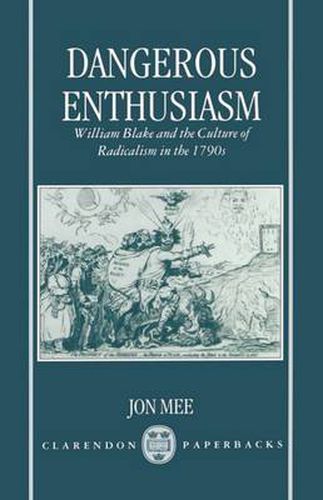Readings Newsletter
Become a Readings Member to make your shopping experience even easier.
Sign in or sign up for free!
You’re not far away from qualifying for FREE standard shipping within Australia
You’ve qualified for FREE standard shipping within Australia
The cart is loading…






William Blake’s work presents a stern challenge to historical criticism. Jon Mee’s new study meets that challenge by investigating contexts outside the domains of standard literary histories. He traces the distinctive rhetoric of the illuminated books to the French Revolution controversy of the 1790s and Blake’s fusion of the diverse currents of radicalism abroad in that decade.Dangerous Enthusiasm presents a more comprehensively politicized picture of Blake than any previous study. It is supported by a wealth of original research which will be of interest to historians and literary critics alike. Blake emerges from these pages as a “bricoleur’ who fused the language of London’s popular dissenting culture with the more sceptical radicalism of the Enlightenment. His prophetic books are shown to be less the expressions of isolated genius than the products of a complex response to the cultural politics of his contemporaries.
$9.00 standard shipping within Australia
FREE standard shipping within Australia for orders over $100.00
Express & International shipping calculated at checkout
Stock availability can be subject to change without notice. We recommend calling the shop or contacting our online team to check availability of low stock items. Please see our Shopping Online page for more details.
William Blake’s work presents a stern challenge to historical criticism. Jon Mee’s new study meets that challenge by investigating contexts outside the domains of standard literary histories. He traces the distinctive rhetoric of the illuminated books to the French Revolution controversy of the 1790s and Blake’s fusion of the diverse currents of radicalism abroad in that decade.Dangerous Enthusiasm presents a more comprehensively politicized picture of Blake than any previous study. It is supported by a wealth of original research which will be of interest to historians and literary critics alike. Blake emerges from these pages as a “bricoleur’ who fused the language of London’s popular dissenting culture with the more sceptical radicalism of the Enlightenment. His prophetic books are shown to be less the expressions of isolated genius than the products of a complex response to the cultural politics of his contemporaries.